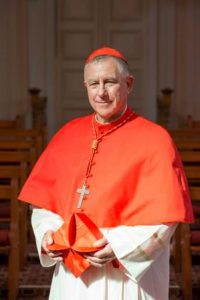WelCom February 2018:
+ John A. Cardinal Dew, Archbishop of Wellington
One of the greatest gifts the Church offers her people is a Catholic funeral. It is often commented that a well-prayed, well-prepared Catholic funeral is treasured and appreciated. It has some depth to it and is not just ‘a sharing of memories’ about the deceased, but a time of sincere prayer enabling people to be engaged and to think deeply about the gift of life and of death. A well-prepared funeral liturgy does the three things the Church offers the deceased and the family.
Firstly, it prays for the deceased and, while asking for God’s mercy for the person who has died, then prayerfully commends that person into the loving kindness of our merciful God. It also offers prayers in thanksgiving for the deceased person and the gifts that his or her life has been to family and friends, to the Church and to society. The prayers and rituals of the Church provide comfort, hope and consolation to all who grieve for the one who has died.
While a Requiem Mass remains ‘the deal’ for a baptised Catholic, it is often not requested. This may be because of unfamiliarity with the mass or of a past experience that wasn’t helpful. Even so, people say they do want a Catholic funeral. Another factor today is that a priest may not always be available, in which case a Requiem Mass is no longer an option.
During 2017, the Archdiocesan Council of Priests has been considering the possibility of lay people being selected and trained to lead funeral liturgies. With fewer priests and with larger parishes, the number of funerals some priests are being called to conduct is becoming unsustainable. It is true too that families are opting for other graveside services only, liturgies in rest homes, and liturgies for cremations and the burial of ashes. There is no reason why lay people cannot lead in these circumstances.
In some dioceses around the world, bishops have formally commissioned lay ministers to celebrate funeral ceremonies in an effort to relieve pressure on priests who sometimes have to celebrate seven or more funerals in any one week. The Council of Priests have looked at this and advised me to begin to prepare lay ministers to celebrate funeral liturgies.
I want people to know that whatever happens, our main concern will be to offer the dignity of a well-prayed and well-prepared liturgy. In most cases it will still be a Requiem Mass, but in some cases, it could be a liturgy celebrated by a lay person. It will also mean the lay leaders will be available to provide continuing support for the bereaved and their families. They will have more time to ensure the service they provide is of the best quality and of the highest professional standard. If people choose a funeral led by a qualified and trained lay minister it will not be ‘second class’ but the prayerful commending of people to God and fully in accord with Catholic teaching.
My concern is to be able to offer the best possible services for the deceased and to their bereaved families. We are very well aware there are people coming to funerals that have very little connection with the Church. Therefore, offering this kind of ceremony and pastoral and practical support becomes an important witness and a way for the Church to show love, care and compassion.
